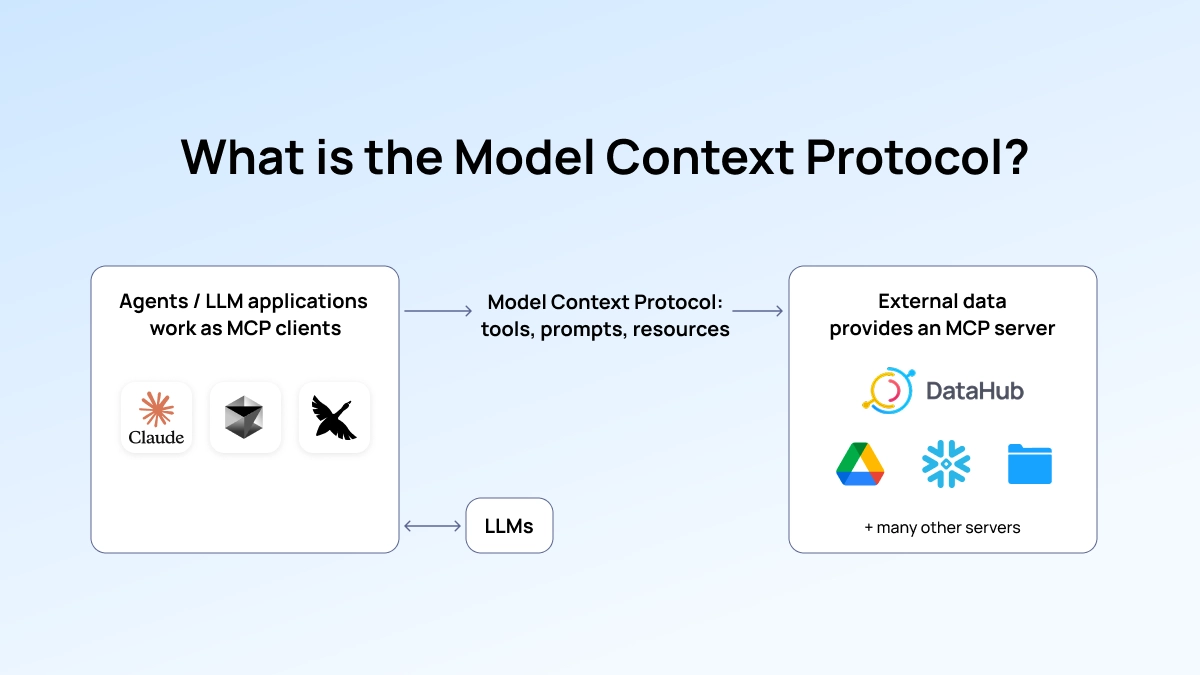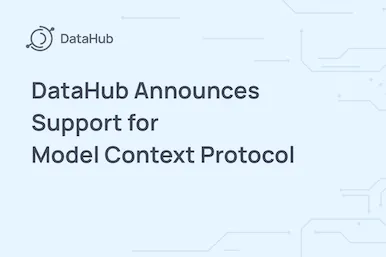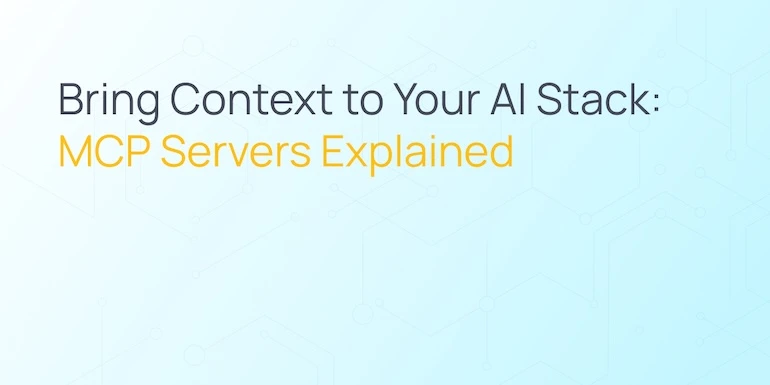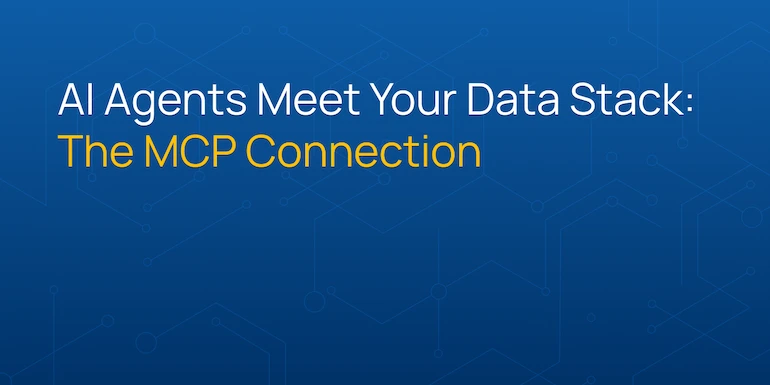DataHub MCP Server: Unlocking AI Agent Potential with Enterprise Data Context
The rise of AI agents has transformed how enterprises interact with data. But they still struggle with a critical missing piece: context.
AI agents are increasingly being considered for enterprise workflows, from internal copilots to external customer-facing automation. Whether powering analytics platforms, performing impact analysis, helping users discover datasets, or enforcing governance policies, these agents depend on data. But raw data alone isn’t enough.
Without understanding how data is structured, interpreted, and governed within the enterprise, even the most sophisticated AI models fall short. They hallucinate answers, misunderstand queries, or return results that violate regulatory requirements. What they’re missing is context.
The Model Context Protocol (MCP) and the DataHub MCP Server solve this problem. Together, they give AI agents standardized, real-time access to rich metadata that provides the full context of enterprise data, including its meaning, its behavior, and its rules.
This page will unpack how the DataHub MCP Server works, how it enables safer, smarter AI agents across the enterprise, and why context-rich metadata is the foundation for trustworthy enterprise AI.
Join our DataHub community
What is Model Context Protocol (MCP)?
The Model Context Protocol (MCP), developed by Anthropic, is an open standard for connecting AI agents to enterprise data, tools, and services. This includes metadata platforms like DataHub, content repositories, business tools, and development environments.
AI agents are often isolated from real-time, relevant enterprise data due to information silos and fragmented API ecosystems. Every new system requires a custom integration, which slows development, increases complexity, and limits the agent’s effectiveness.
MCP solves this with a universal protocol that establishes secure, two-way communication between AI tools and enterprise data sources. Rather than building brittle point-to-point integrations, developers can:

This architecture enables AI agents to request, retrieve, and reason over metadata and contextual information from any MCP-enabled source—without needing custom code for every new data system or service.
Why MCP matters for AI to work with data
As AI agents become more advanced in finding, accessing, and using data, their performance is increasingly constrained by a lack of access to context. MCP provides a standardized way for agents to access the rich, structured metadata they need—without requiring custom connectors for every tool, catalog, or database.
With MCP:
- Developers gain a simple, scalable framework for enabling context-aware AI
- Organizations reduce time-to-integration and avoid brittle, one-off connectors
- AI agents gain real-time access to metadata, lineage, glossaries, ownership info, and other critical context
The result is a reliable, interoperable communication layer that helps AI systems deliver more accurate, relevant, and safe responses.
What about APIs?
An MCP server acts as an LLM-oriented curation layer and documentation layer on top of your APIs.
While APIs demand deep expertise in each source system and a dedicated tool for every integration, MCP servers are dynamic, self-describing, and AI-native—enabling easier integration and more adaptable agents.
An MCP server also puts the onus of building opinionated tool abstractions on the system provider, like DataHub. The system provider, rather than the user, needs to think critically about what endpoints or tools should be exposed to the LLM in a way that is valuable without being overwhelming.
What is the DataHub MCP Server?
DataHub MCP Server is a server implementation that bridges the gap between AI agents and your organization’s data context. It enables AI agents like Claude Desktop, Cursor, or any MCP-enabled tool to query DataHub for important context about your data ecosystem through natural language.
DataHub MCP Server enables AI agents to understand your business’s unique data landscape through rich context.
Think about it this way: Imagine hiring a new data analyst and dropping them into your stack with zero onboarding. How successful would they be? An AI agent isn’t any different. Without access to metric definitions, trust signals, and the tribal knowledge your data team relies on, it’s operating in the dark.
Just like human analysts, AI agents need context to succeed. That’s exactly what DataHub MCP Server provides.
RECOMMENDED READING
How the DataHub MCP Server works
DataHub ingests metadata from your entire data stack and then models that metadata into a rich semantic graph. The DataHub MCP Server exposes that graph to AI agents through a standardized, MCP-compliant interface. All while maintaining the same access controls and policies you already have set up in your DataHub instance.
The result: AI agents can query for metadata context just like human analysts can. But instead of manually searching through a data catalog or Confluence page, the agent gets structured, reliable, machine-readable responses instantly.
What tools are available via the DataHub MCP Server?
The DataHub MCP Server allows any MCP-compatible agent to access a growing set of tools, including:
search: Find datasets, dashboards, and other entities using structured keyword search with boolean logic, filters, and paginationget_entities: Retrieve detailed metadata for one or more entities by URN with support for batch retrievalget_lineage: Explore upstream or downstream lineage for any entity with filtering, pagination, and hop controlget_dataset_queries: Fetch real SQL queries referencing a dataset or column to understand usage patterns, joins, filters, and aggregation behaviorlist_schema_fields: List schema fields for a dataset with keyword filtering and paginationget_lineage_paths_between: Retrieve the exact lineage paths between two assets or columns, including intermediate transformations and SQL query information
We’re actively expanding the DataHub MCP Server’s capabilities to support more intelligent and context-aware AI integrations. Keep an eye on our MCP Server docs page and product updates for new tool additions.
Key benefits of the DataHub MCP Server
Example use case of the DataHub MCP Server
With the DataHub MCP Server, users can ask agents nuanced questions like:
“What are the best tables to analyze customer lifetime value?”
Instead of a human analyst manually searching for datasets, checking for documentation, trust signals, and table owners, the agent taps into DataHub’s metadata graph to return context-aware results—automatically and reliably.
See it in action.
With the DataHub MCP Server, agents don’t just generate answers. They apply critical context to make the right decisions about which data to use and how.
How AI agents work with DataHub’s MCP Server
When AI agents connect to the DataHub MCP Server, they evolve from simple query responders into context-aware assistants capable of driving real impact across your data stack.
These MCP-enabled agents gain structured access to metadata context, enabling intelligent support for data discovery, lineage analysis, and automated governance.
Data discovery
When connected to DataHub through the MCP Server, AI agents become powerful tools for intelligent data discovery.
Instead of manually searching through catalogs, users can ask natural language questions and receive context-aware, accurate results.
These agents interpret business concepts and translate them into technical searches across DataHub’s metadata graph, automatically identifying relevant datasets while factoring in data quality, freshness, and access controls.
By leveraging DataHub’s semantic metadata model, agents go beyond simple keyword matches. They also surface:
In large enterprises, where data is distributed across many systems, this capability dramatically improves discoverability and accelerates time-to-insight.
Data lineage understanding
Data lineage is critical for change management, debugging, and impact analysis. But it’s also notoriously hard to trace manually.
MCP-enabled AI agents can:
- Traverse DataHub’s lineage graph across pipelines and platforms
- Explain how data is transformed and why
- Identify pipeline owners and decision-makers via ownership metadata
- Run impact analyses on proposed changes to upstream sources
By surfacing both technical dependencies and business logic, agents help teams understand how data flows and what might break if something changes.
Data governance
Governance is one of the most complex domains in enterprise data management, but also one where MCP-powered agents shine.
These agents leverage DataHub’s comprehensive governance capabilities to:
- Enforce policies automatically while understanding business context for appropriate exceptions
- Identify who has the authority to approve exceptions using DataHub’s ownership and stewardship data
- Explain access policies, compliance requirements, and data handling restrictions to users
- Guide users through approval processes defined in DataHub’s workflow integration
- Route requests to appropriate data stewards identified in DataHub’s ownership metadata
- Maintain comprehensive audit trails of data access and usage through DataHub’s audit logging
By combining automated enforcement with contextual intelligence, these agents serve as intelligent governance assistants that make complex data governance scalable across the organization.
DataHub MCP Server use case examples
Equipping AI agents with rich metadata via the DataHub MCP Server unlocks a transformational shift in how data teams operate, collaborate, and deliver business value. The potential is virtually limitless.
For developers: Intelligent development partners
With the DataHub MCP Server, developers gain AI assistants that can:
- Understand code dependencies, data transformations, and system architectures mapped in DataHub’s dependency graphs, without requiring extensive documentation or tribal knowledge transfer
- Trace issues across multi-system architectures using DataHub’s comprehensive lineage tracking
- Identify root causes in pipeline failures and suggest remediation strategies based on historical resolution patterns
- Spot potential data quality issues and recommend performance optimizations based on DataHub’s usage analytics
- Ensure new implementations follow established patterns
- Identify opportunities for code reuse, standardization, and optimization using semantic relationships
- Ensure compliance with governance policies maintained in DataHub’s policy framework
By combining technical metadata with business context and operational constraints, these agents will not just help developers write code—they will help them write better, more reliable code that integrates seamlessly with existing data infrastructure.
For analysts: AI-powered research assistants
With the DataHub MCP Server, analysts are supported by AI agents that:
- Automatically identify relevant data sources for specific business questions using DataHub’s semantic search capabilities
- Understand quality and reliability characteristics that affect analytical confidence
- Guide analysts toward high-value data assets and explain complex relationships and dependencies through DataHub’s lineage visualization
- Provide contextual information about data collection methodologies, seasonal patterns, and historical anomalies captured in DataHub’s comprehensive metadata that affect interpretation
- Suggest appropriate analytical approaches based on data characteristics and business objectives documented in DataHub’s business context and collaborative knowledge base
- Understand business definitions maintained in DataHub’s glossary and metric calculations documented in DataHub’s semantic model for accurate report creation
- Identify potential data quality issues that might affect report accuracy using DataHub’s quality monitoring systems
- Recommend visualization approaches that optimize understanding and decision-making based on usage patterns
By understanding business contexts, data quality implications, and analytical methodologies, these agents can help analysts spend less time on manual data preparation and more time on strategic analysis and insight development.
For data scientists: Context-aware collaborators
With the DataHub MCP Server, data scientists can gain AI agents that:
- Suggest relevant features based on business context captured in DataHub’s semantic model and historical model performance
- Identify potential data quality issues that might affect model training using DataHub’s comprehensive quality framework
- Provide guidance about appropriate validation methodologies based on data characteristics and business applications documented in DataHub’s governance system
- Track experimental iterations using DataHub’s version control integration and maintain lineage information for reproducibility through DataHub’s comprehensive lineage tracking
- Suggest optimization opportunities based on performance patterns and resource utilization monitored in DataHub’s operational intelligence
- Provide intelligent alerting based on business impact rather than just technical metrics using DataHub’s business context
- Suggest retraining strategies based on data drift patterns detected in DataHub’s monitoring systems and help maintain model performance across changing business conditions tracked in DataHub’s temporal metadata
By understanding experimental contexts, model lineage, and business applications maintained in DataHub, these agents can enhance both productivity and reproducibility throughout the entire model lifecycle.
For data governance teams: Automated policy enforcement
With the DataHub MCP Server, data governance teams can leverage AI agents that:
- Enforce policies automatically while understanding business context, determining when exceptions might be appropriate and who has authority to approve them according to DataHub’s access roles tracking
- Help users understand access policies, compliance requirements, and data handling restrictions documented in DataHub
- Maintain comprehensive audit trails of data access and usage through DataHub’s comprehensive logging
- Analyze proposed data uses against regulatory requirements and organizational policies maintained in DataHub’s governance platform
- Identify potential violations before they occur and handle routine compliance checking and enforcement using DataHub’s automated governance workflows
- Automatically identify sensitive data elements using DataHub’s automated classification capabilities and recommend appropriate protection measures
- Maintain consistent policy application across complex, distributed data environments using DataHub’s unified governance framework
By serving as intelligent governance assistants, these agents will allow governance teams to focus on strategic policy development and exception management while automating routine compliance tasks.
For end customers: More trustworthy, context-aware AI features
With the DataHub MCP Server, end users could benefit from AI-powered applications that:
- Understand data quality, business rule exceptions, and other contextual factors that impact service reliability and accuracy
- Deliver insights and recommendations grounded in business context captured in DataHub’s rich metadata
- Translate natural language business questions into technically precise analyses, then surface results in clear, business-relevant terms using DataHub’s business glossary
- Guide non-technical users through complex analytical workflows by tapping into DataHub’s process documentation and surfacing appropriate data sources and methodologies
- Provide contextual guidance that helps users avoid common misinterpretations, drawing from DataHub’s comprehensive knowledge base
The result: customers can harness advanced analytical capabilities without requiring technical expertise, enabling more reliable and contextually relevant AI experiences that drive real business value.
For the organization: Strategic agility, innovation, and risk reduction
The DataHub MCP Server empowers organizations to move faster, innovate smarter, and operate with greater confidence. With it, teams can:
With DataHub’s context-rich foundation made accessible through the DataHub MCP Server, organizations can unlock next-level innovation while ensuring every step is governed, auditable, and aligned to business objectives.
RECOMMENDED READING
The bottom line: MCP + DataHub = Context-driven AI
As AI agents become more integrated into enterprise workflows, their success hinges not just on model performance, but on access to trusted context.
The Model Context Protocol (MCP) provides the communication standard.
DataHub delivers the enterprise metadata foundation.
Together through the DataHub MCP Server, they enable AI agents to reason, recommend, and operate with the business understanding, technical awareness, and governance intelligence that data-driven organizations demand.
This is not just the future of metadata. It’s the future of intelligent data operations. Where AI agents become true partners, capable of supporting every layer of the modern data stack.
Get started with the DataHub MCP Server
Ready to unlock the full potential of AI with enterprise metadata?
Connect to the DataHub MCP Server
Dive into our docs to learn how your AI agents can connect to DataHub through the DataHub MCP Server
Join the DataHub open source community
Join our 13,000+ Slack community members to collaborate with the data practitioners who are shaping the future of data and AI
Talk to our team
Need context management that scales? Book a meeting with our team to discuss how DataHub Cloud can support your enterprise needs


